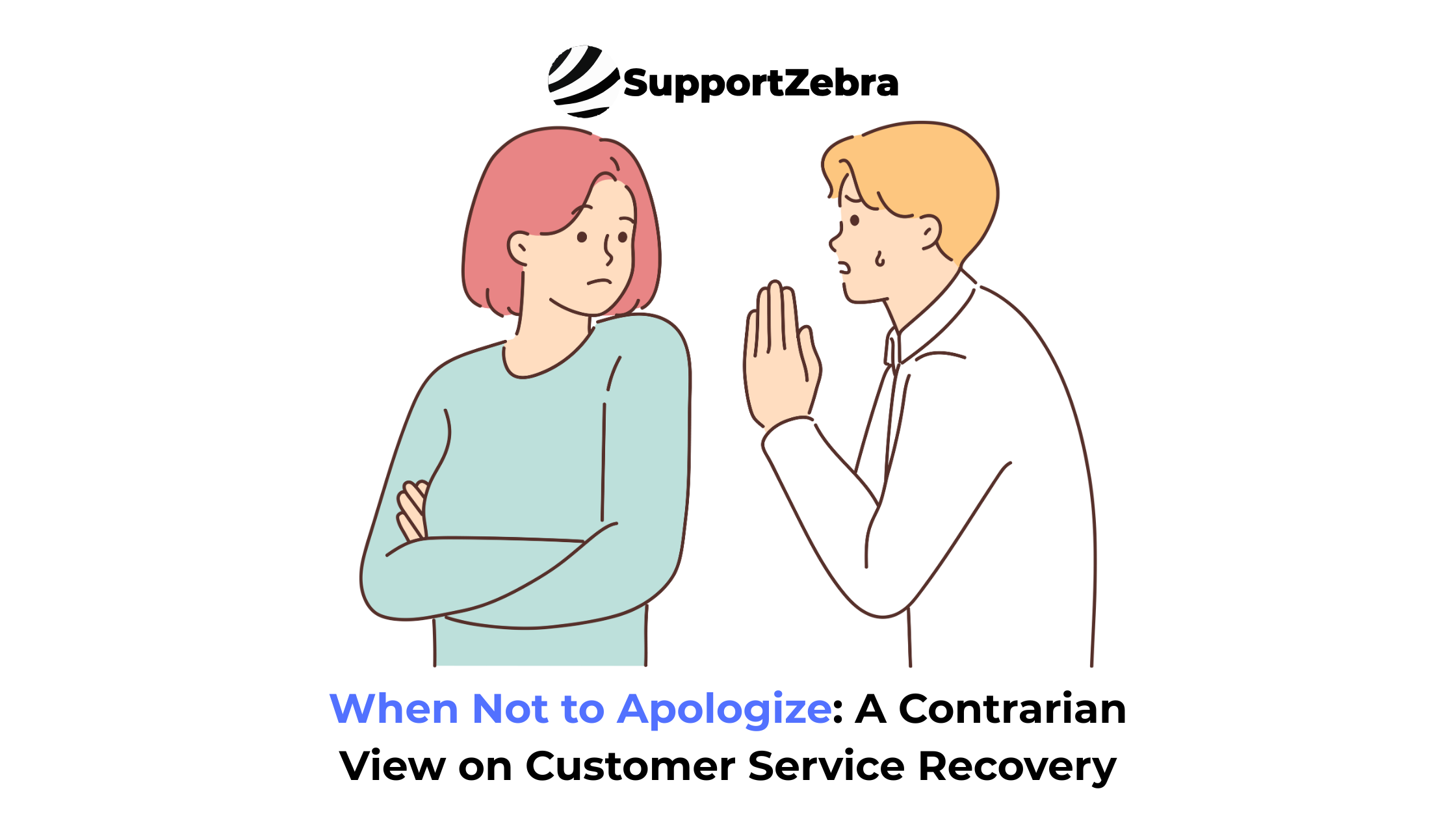Stop Apologizing! Here's Why It's Ruining Your Customer Relationships
- Over-apologizing can weaken trust, create unrealistic customer expectations, and harm long-term loyalty.
- In some cases, apologizing may imply legal liability or escalate issues instead of resolving them.
- Empathy, validation, active listening, and offering concrete solutions can effectively replace unnecessary apologies.
- SupportZebra promotes a modern approach to service recovery—focusing on understanding, action, and lasting customer trust instead of routine apologies.
What if everything you thought you knew about customer service recovery was wrong? Traditionally, the belief has been that offering an apology is essential for resolving problems and nurturing customer loyalty. Yet, this alternative perspective contests that idea, suggesting that over-apologizing can damage customer relationships.
This article will explore why apologies might not be the most effective solution. It aims to present a new viewpoint on customer service recovery and propose different strategies for effectively managing customer issues.
The Impact of Over-Apologizing
Excessive apologizing can create an impression of vulnerability, undermine trust and authority, and raise customer expectations. It may indicate a lack of confidence in customer service agents, which can reduce trust in their problem-solving capabilities. Frequent apologies can also generate a negative brand perception, damaging long-term loyalty.
Furthermore, customers might cultivate inflated expectations and a sense of entitlement, resulting in dissatisfaction. Businesses can realign expectations and nurture more positive customer relationships by curbing the tendency to over-apologize.
Situations Where Apologizing May Not Be Beneficial
Apologies are usually seen as a crucial aspect of customer service recovery, but there are specific cases where saying sorry might not be helpful and could make things worse.
Let’s take a look at a few crucial situations to keep in mind:
- Scenarios Where Apologies Could Imply Legal Liability
Expressing apologies for unclear errors may be seen as an admission of legal responsibility, which can result in legal issues or a rise in customer grievances. Companies should seek legal counsel before apologizing for safety concerns or product flaws.
- Cases Where Apologies Might Escalate Customer Expectations Unreasonably
Acknowledging mistakes or unreasonable requests can elevate customer expectations. However, placing too much emphasis on apologies may lessen their impact and foster unrealistic anticipations, ultimately obstructing the company’s ability to resolve issues effectively.
- Other Considerations
If the company has resolved the customer’s concern, an apology might not be required. Instead, prioritize effective communication and empathy. If appropriate, provide a sincere, personalized apology and clarify the situation.
In these scenarios, service providers must address customer service recovery carefully, weighing the potential consequences of apologizing while finding alternative methods to resolve customer dissatisfaction without compromising legal positions or setting unrealistic expectations.
Alternative Strategies to Apologies

In customer service recovery, not every situation necessitates an apology. Recognizing when to employ alternative strategies can significantly enhance conflict resolution. These alternatives, which avoid apologies, can maintain positive customer relationships and safeguard service providers from potential legal complications or unrealistic customer expectations.
- Empathy without Apology
Service providers can show understanding and validation without saying, “I’m sorry.” Acknowledging the customer’s feelings and frustrations with phrases like “I can see why you’d feel this way” or “Understandably, you’re upset,” ensures the customer feels heard and validated without admitting fault.
- Validating Customer Concerns
Providers need to acknowledge the customer’s experience or dissatisfaction. By saying things like “We appreciate you bringing this to our attention” or “We understand why this situation is troubling for you,” providers can validate customer concerns without implying an apology.
- Active Listening
Service providers must pay full attention to their words, body language, and emotions to truly engage with customers. Summarizing what the customer has said and asking clarifying questions shows a genuine commitment to finding a solution. This builds trust and understanding without the need for an apology.
- Offering Solutions and Alternatives
Instead of apologizing, focusing on solving the problem or offering alternatives can be more effective. By proposing actionable steps or options, the customer sees that the service provider is proactive and dedicated to resolving the issue, which can compensate for the absence of an apology.
- Follow-Up
It’s crucial to ensure the issue is resolved and follow up with the customer to confirm their satisfaction. This demonstrates the provider’s commitment to excellent service and allows the provider to mend and strengthen the relationship without needing an apology.
By incorporating these methods instead of merely apologizing, service providers can effectively manage conflicts through customer service recovery, uphold professionalism, and nurture positive customer relationships.
SupportZebra’s New Paradigm in Customer Service Recovery
Strategies that do not rely on apologies, emphasizing empathy, active listening, and decisive action, can assist businesses in managing intricate service issues while preserving robust customer relationships. This approach necessitates transitioning from conventional apology-focused techniques to flexible and contextually appropriate responses.
SupportZebra is changing how customer service recovery works by moving beyond simple apologies. We emphasize skills like empathy, active listening, and finding solid solutions to address challenging service problems and strengthen customer connections. We champion proactive problem-solving by stressing the importance of understanding and empathetic communication.
Our training programs are designed to instill active listening skills and include role-playing exercises to prepare our team for handling even the most challenging situations. This approach elevates industry standards and inspires organizations to rethink how they address service issues, ultimately fostering greater loyalty and trust among customers.
Discover how SupportZebra can revolutionize your customer service recovery efforts—contact us today to learn more!

